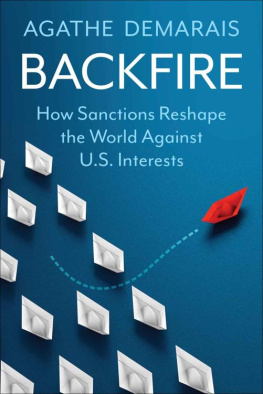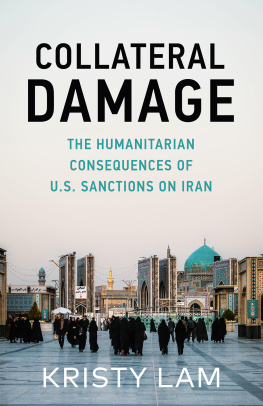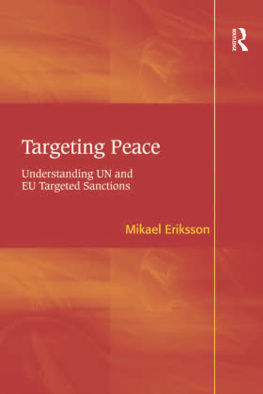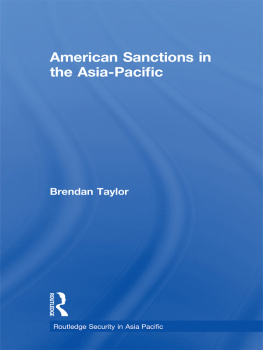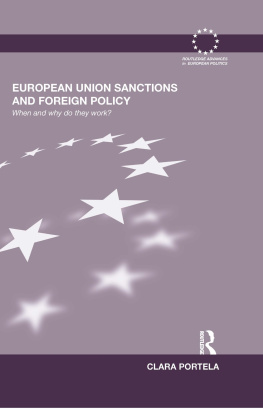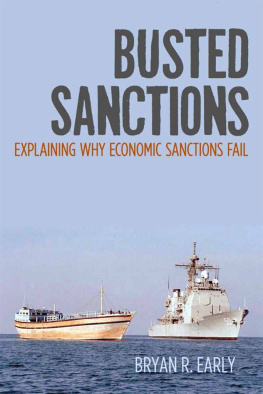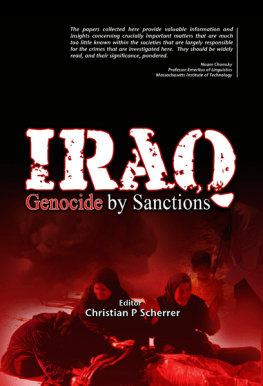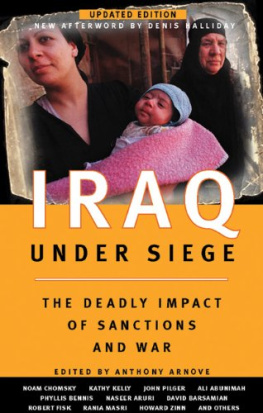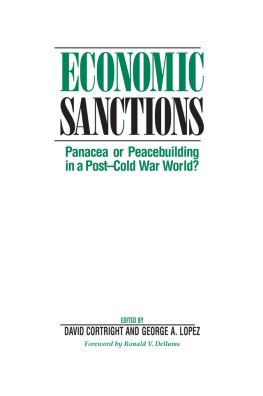Backfire
Center on Global Energy Policy Series
Center on Global Energy Policy Series
Jason Bordoff, series editor
Making smart energy policy choices requires approaching energy as a complex
and multifaceted system in which decision makers must balance economic, security, and
environmental priorities. Too often, the public debate is dominated by platitudes and
polarization. Columbia Universitys Center on Global Energy Policy at SIPA
seeks to enrich the quality of energy dialogue and policy by providing an independent
and nonpartisan platform for timely analysis and recommendations to address todays
most pressing energy challenges. The Center on Global Energy Policy Series extends that
mission by offering readers accessible, policy-relevant books that have as their foundation
the academic rigor of one of the worlds great research universities.
Robert McNally, Crude Volatility: The History and the Future of Boom-Bust Oil Prices
Daniel Raimi, The Fracking Debate: The Risks, Benefits, and Uncertainties of the Shale Revolution
Richard Nephew, The Art of Sanctions: A View from the Field
Jim Krane, Energy Kingdoms: Oil and Political Survival in the Persian Gulf
Amy Myers Jaffe, Energys Digital Future: Harnessing Innovation for American Resilience and
National Security
Ibrahim AlMuhanna, Oil Leaders: An Insiders Account of Four Decades of Saudi Arabia and
OPECs Global Energy Policy
David R. Mares, Resource Nationalism and Energy Policy: Venezuela in Context
Backfire
How Sanctions Reshape the
World Against U.S. Interests
Agathe Demarais
Columbia University Press
New York
Columbia University Press
Publishers Since 1893
New YorkChichester, West Sussex
cup.columbia.edu
Copyright 2022 Agathe Demarais
All rights reserved
EISBN 978-0-231-55333-9
Library of Congress Cataloging-in-Publication Data
Names: Demarais, Agathe, author.
Title: Backfire : how sanctions reshape the world against U.S. interests /
Agathe Demarais.
Description: First Edition. | New York : Columbia University Press, [2022] |
Includes bibliographical references and index.
Identifiers: LCCN 2022015745 | ISBN 9780231199902 (Hardback) |
ISBN 9780231553339 (eBook)
Subjects: LCSH: Economic sanctionsPolitical aspects. | World politics. |
Economic sanctions, AmericanPolitical aspects.
Classification: LCC KZ6373 .D46 2022 | DDC 341.5/82dc23/eng/20220801
LC record available at https://lccn.loc.gov/2022015745
A Columbia University Press E-book.
CUP would be pleased to hear about your reading experience with this e-book at .
Cover design: Milenda Nan Ok Lee
Cover image: welcomeinside / Shutterstock
To my grandparents
Contents
I n 2002 a brutal civil war was raging in Sudan. In an attempt to force Khartoum to start peace talks with the opposition, members of the U.S. Congress discussed imposing sanctions on energy firms working in the African country. The reasoning of the American lawmakers was simple: the threat of sanctions might be sufficient to persuade the Sudanese government, anxious to avoid an exodus of foreign businesses from Khartoum, to negotiate with the rebels. Congress decided that the best way to pile the pressure on Sudans rulers was to impose innovative measures preventing the global oil companies that did business with Sudan from raising capital on U.S. financial markets.
The U.S. administration fiercely opposed Congresss proposal, fearing that such sanctions would ultimately hurt America. They would in any case have been largely symbolic; amid the devastation brought by the conflict, only three companiesfrom Canada, China, and Swedenwere still operating in Khartoum. Yet barring foreign businesses from tapping U.S. financial markets appeared to run counter to Washingtons long-held commitment to the free movement of capital, one of the ingredients of Americas economic success. Skeptics pointed out that to escape American sanctions, multinationals could also be tempted to raise debt or issue stocks in other financial centers such as London, Singapore, or Tokyo. It looked like Washington was going to shoot itself in the foot. In the end, Congress shelved its proposal.
The controversy over the Sudan sanctions started a debate about sanctions overreach. Since then, the discussion has never stopped. It has become even more intense in recent years as coercive economic measures, such as trade tariffs, financial sanctions, and export controls, have become the bedrock of U.S. diplomacy. However, trouble is looming. The over-use of sanctions is fueling resentment against Washington around the world, leading U.S. friends and foes alike to rethink their ties to America and find alternative avenues for doing business. This is exactly what critics of the Sudan sanctions had feared.

It is not surprising that sanctions have become so popular over the past two decades: they have many selling points. For one, they are a quick way for the United States to demonstrate resolve and punish bad behavior. After Russia invaded Ukraine in 2022, it took Washington less than two days to impose penalties on Moscow. In addition, sanctions are a low-cost policy. Only a handful of civil servants are needed to draft sanctions. The burden of implementing U.S. sanctions falls on multinationals and banks, which shoulder lost opportunities and compliance costs.
The immediate political and human costs of sanctions also appear to be low, making them more attractive than other forms of coercion, such as military intervention. Sanctions fill the void in the diplomatic space between ineffective declarations and potentially deadly military operations. With sanctions, the U.S. administration can pressure countries to comply with its demands from the safety of Washington. When journalists asked Treasury Secretary Steven Mnuchin what the United States could do to halt Turkeys attack against the Kurds in Syria in 2019, his default response was to invoke sanctions: We can shut down the Turkish economy.
Finally, U.S. sanctions have proven to be effective in persuading countries to alter their behavior. Iran is a case in point. If sanctions had not put It is therefore not surprising that Congress has long been the most enthusiastic backer of sanctions; politicians have constituents to please, and appearing to act decisively to defend U.S. interests is usually a vote winner.

I discovered sanctions while working as a financial attach for the French Treasury in Moscow in 2014. I had a crash course in sanctions after Russia illegally annexed Crimea and started to back separatist rebels in eastern Ukraine. I continued to develop my knowledge of sanctions in my next posting, at the French embassy in Beirut. From there, I followed economic and financial developments in 15 Middle Eastern countriesincluding several that were under U.S. sanctions, such as Iran, Iraq, Lebanon, Syria, and Yemen. I spent around half of my time on the ground, having long conversations with government officials, businesspeople, and ordinary citizens about life under sanctions.

